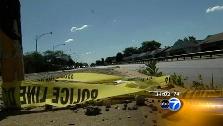Neighborhood homicides can have a detrimental effect on Chicago schoolchildren's academic performance, whether they witness the violence or not, according to a study published Monday in the Proceedings of the National Academy of Sciences.
Using Chicago crime reports and the reading and vocabulary assessments of a sample of Chicago children, sociologist Patrick Sharkey of New York University found African-American children scored substantially lower on reading and vocabulary tests within a week of a homicide in their neighborhood.
The effect on performance was seen regardless of whether the children were physically harmed, were witnesses to the crime or had merely heard about the violence, the study reported.
"The impact of violence is not limited to those victimized or those who directly witness an act of violence but is felt by children across a community who live in close proximity to extreme violent events," Sharkey said.
The study did not examine what specifically caused children to get lower scores, but research on how children react to stress points to reduced concentration, inability to focus and sleep disturbances.
"All of these are potential explanations that I did not test explicitly," Sharkey said. "What this study does is establish more convincing estimates of the causal impact of this type of extreme violence."
The study analyzed 6,041 homicides reported to the Chicago Police Department between 1994 and 2002 as well as testing data on about 1,100 African-American children ages 5 to 17, a subset of the Project on Human Development in Chicago Neighborhoods.
Scores from tests taken by neighborhood children after a homicide occurred were compared with the scores of other children in the same area from before the killing.
Data on Hispanic students did not show the same negative effect, and data on other racial and ethnic groups were excluded because so few of those children were exposed to neighborhood homicides. Chicago crime statistics show that black children are the most likely to be exposed to community violence.
The effect of a homicide decreased as the window of time between the homicide and the assessment expanded beyond a week, and it disappeared after about nine days. In Chicago's most violent neighborhoods, children's thinking ability may be impaired for about one week out of every month.
The study, which looked at block groups, census tracts and neighborhood clusters, also found that the effect of a homicide was greater the closer it occurred to the child's home.
Psychologist Tali Raviv, who works with Chicago Public Schools to help students cope with exposure to trauma, said the schools are the best place to reach such children. Numerous barriers, including stigma and finances, make it difficult for low-income families to access needed services.
"We know that only a fraction of kids who need mental health services make it to Children's Memorial Hospital or other community mental health agencies," said Raviv, of the Community-Linked Mental Health Services Program at Children's Memorial.
"These neighborhoods are very violent, and some children's responses are adaptive," Raviv said. "But there are significant consequences of that behavior that affects their ability to stay in school. ... They are more likely to be suspended, expelled or fail to graduate."
Raviv said the negative impact of violence on children needs to be considered when looking at disparities in educational achievement, such as school graduation rates.
"As a society we need to come up with new ways of thinking about these problems," she said. "How do we prevent community violence? And how do we support children who have to cope with problems beyond what they are equipped to handle




















